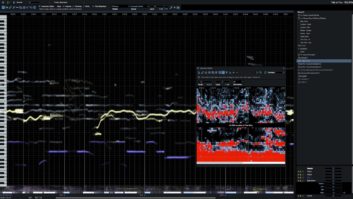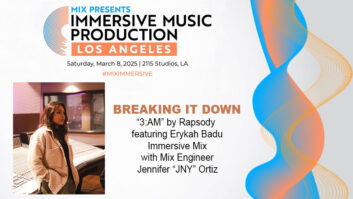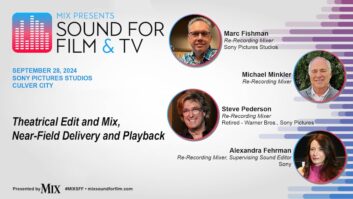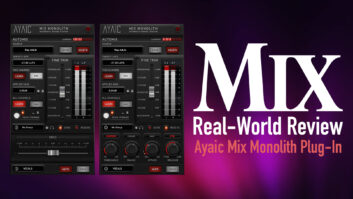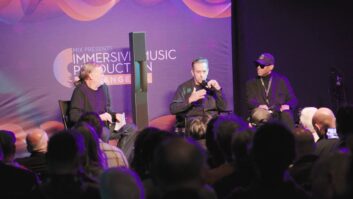New York, NY—A personal production setup these days can be anything from a full-blown recording studio to rival high-end commercial facilities to something as simple as a laptop, an interface and headphones. But Jenn Vix’s production rig features something unusual: a dinosaur.
Vix, a multi-instrumentalist, songwriter, engineer and producer, has had a storied musical career—well, a storied life, really. “I spent my childhood going back and forth between Miami and Rhode Island. Then I moved to New York City in 1979 when I was 12 years old, so I spent my formative years in New York City. I was also homeless and on the streets for quite some time. I was a runaway,” she says.

“I’ve always known that [music] is what I wanted to do since I was about 3 years old. I made it happen.”
She first stood in front of a mixing desk in 1985, she recalls. “I hooked up with a guitar player when I was a teenager, which is how I got into recording. When I started out, we recorded everything to tape. I started on 16-track, then moved to 24-track with a Soundcraft mixing desk” at one collaborator’s studio, she reports. “That’s where I learned to use analog gear. I’ve also recorded to ADAT with another recording partner. So I’ve worked on a lot of different formats.”
Related: Back to The Futureheads, by Steve Harvey, Sept. 24, 2019
Today, her setup is based around Steinberg’s Cubase. “I’m a Cubase loyalist. It’s my favorite program,” she says. “I’ve tried Logic, Pro Tools—they’re just not my thing.”
Vix has two versions of Cubase running at the same time, including one on an HP laptop running Windows 10, with a MOTU interface. “I’m not running a Mac because I don’t have Mac money. But I hope to upgrade eventually,” she says.
As for the other instance of Cubase, “Here’s where it gets weird,” she says. “I’m kind of nostalgic and have a secondary computer that I built quite some time ago. It’s an old Intel-based computer that I built from the motherboard up. It’s still running Windows XP. I’m running a MOTU Traveler Mk 1 with FireWire into Cubase 4.”
That version of Cubase was introduced in 2008, a lifetime ago in digital years, but there’s a reason for running a dinosaur system, she explains. “It’s not just for sentimental reasons, although I love working on something that I built myself. The main reason I like to run it when I write songs is that I find I’m less bogged down with choices because I don’t have 20 plug-ins running at once, therefore I become more creative. The burden of choice is a real thing.”
She adds, “If I need more power, I go over to the newer machine. I go back and forth.”
For outboard, she has a Summit Audio 2BA-221 mono tube pre. “I have a Shure SM48 microphone that I love for certain things, as well as an AKG 414 XL II, which is my go-to,” she says.
“People are listening to music on small devices and laptops with headphones,” Vix says, and much of her music is distributed digitally, “so when I mix these days, I mix primarily for headphones.” Both computers are paired with Sennheiser headphones, but she also uses Alesis M1 active monitors: “They sound great.”
Related: Studio Showcase: Blackbird Studio Takes Immersive to the Next Level, by Steve Harvey, Aug. 28, 2019
Vix has the Waves Mercury bundle on both computers. “It’s absolutely phenomenal—I would be lost without it,” she says. “And I have a bunch of Steinberg plug-ins,” including Groove Agent, Steinberg’s rhythm plug-in. “But I also have an electronic drum kit, because I’m a drummer as well.”
The sound of the new wave and post-punk bands that came through New York City during the ’80s still informs Vix’s music, which on her latest release, a six-song EP entitled 6, focuses on electro-pop. On past releases, she’s detoured into alt-rock, trip-hop, darkwave, modern new wave and electro-industrial territory.
The latest tracks benefit from programmed and live electronic drums, but one song, “Show Me the Sun,” features Dave Barbarossa, who introduced Burundi tribal beats to a wider audience while playing drums with Adam and the Ants, then Bow Wow Wow. Vix first met Barbarossa when Bow Wow Wow opened on The Police’s 1982 tour for Ghost in the Machine, she says. “I got to meet so many people because I lived in New York. I was hanging out in the nightclubs where they were hanging out.”
Her first band experience, a one-off, was singing with Disco Donut, which featured Adam Horovitz (Ad-Rock of the Beastie Boys) on bass. She’s since collaborated with numerous musicians with whom she’s connected since that time, including John Ashton, original guitarist for the Psychedelic Furs; Reeves Gabrels, current guitarist with The Cure and previously with David Bowie and Tin Machine; Marco Pirroni, guitarist with Adam Ant and Sinéad O’Connor; and the late Andy Anderson, known for his work with The Cure in the early ’80s and with Steve Hillage.
Related: Berklee Teams with Steinberg to Bring in Cubase, Aug. 5, 2019
Vix also shoots and edits music videos, for herself and others, and owns Vortex Music Management, managing herself and Positive Negative Man, a three-piece based in Boston, MA. “They’re a modern post-punk band. I think they’re brilliant. I don’t write with them, but I’ll get on stage and sing a couple of songs with them. I recorded their latest EP and helped them with a music video.”
A new Jenn Vix song might start with a bass, a piano or a vocal melody, she says. “It always—99.9 percent of the time—starts with a chorus hook and I build from there. I grew up listening to catchy music, like New Order, but I do like some stuff that is not considered pop, like King Crimson.”
But you won’t catch her copying and pasting sections for the sake of convenience. “I punch in if I must, but I try to track everything live all the way through.” That said, though she’s not a big fan of Auto-Tune, she’ll use it sparingly if it saves having to retake an entire track.
“I like that human verve in my recordings. I don’t want it to sound repetitive or computer-like,” she says. “I need that human element.”
Jenn Vix • www.jennvix.band
Twitter: @JennVix
Spotify: Jenn Vix


